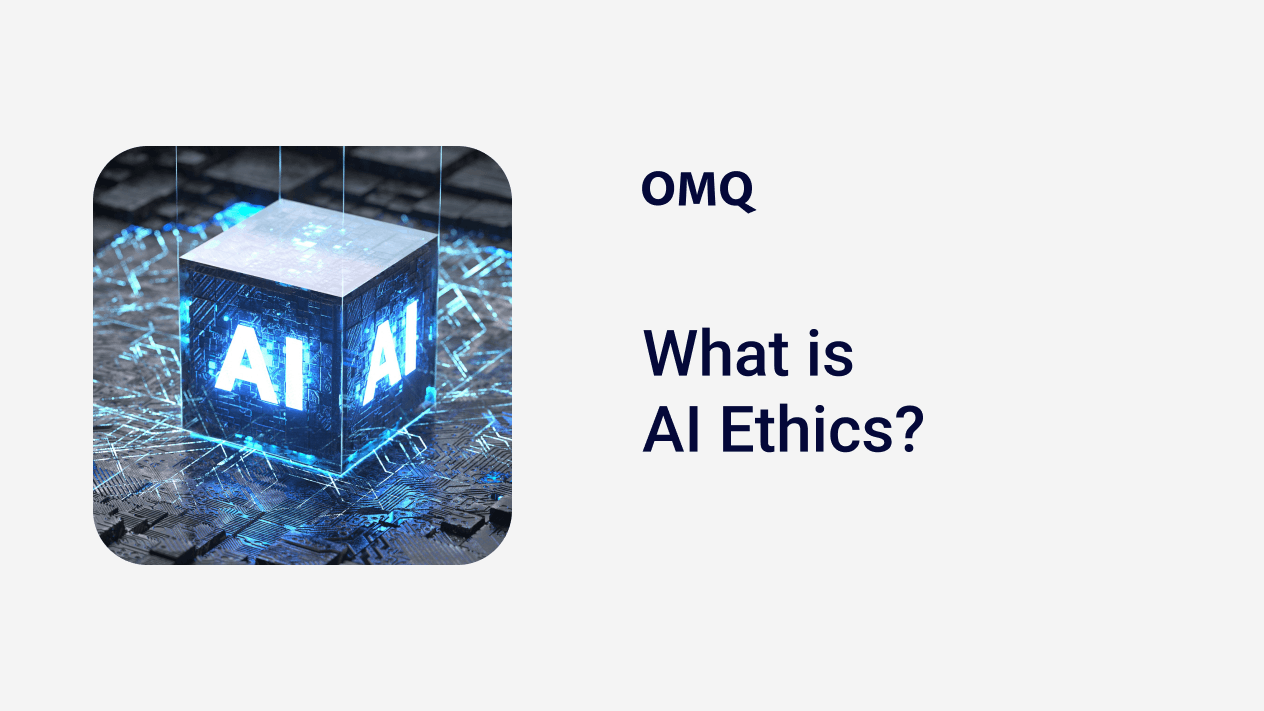Artificial Intelligence
Sustainability: 7 Key Points We Implement as an AI Company
Learn how we as an AI company implement sustainability in 7 key areas to strengthen our environmental responsibility and promote forward-thinking innovations.
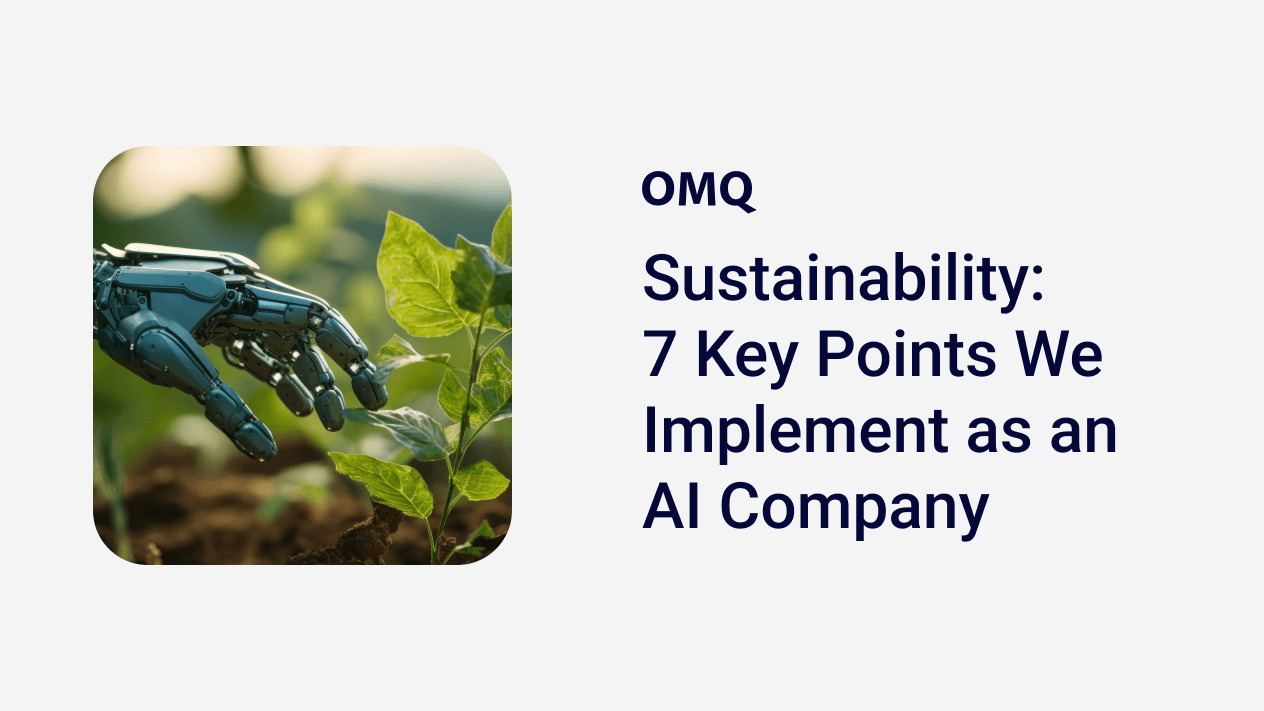
Sustainability is no longer just a trend but a necessity – especially in the tech industry. As an AI company, we bear a dual responsibility: on the one hand, we drive innovation, and on the other, we must ensure that our solutions are resource-efficient and environmentally friendly – because AI, in particular, consumes a lot of computing power and, thus, a significant amount of energy.
But how can technological advances be reconciled with sustainable practices? In this article, we present seven concrete measures with which we, as an AI company, reduce our ecological footprint and create a more sustainable future.
What is Sustainability?
Sustainability means using resources in such a way that they remain available for future generations. Three central areas are considered:
- Ecological Sustainability: Careful use of natural resources, reduction of CO₂ emissions, and prevention of environmental pollution.
- Economic Sustainability: Long-term stable business models that enable economic growth without causing ecological or social harm.
- Social Sustainability: Fair working conditions, ethical corporate governance, and positive societal impacts.
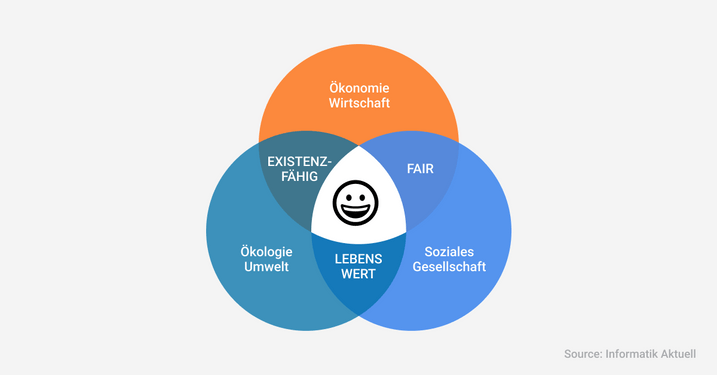
The 3 Pillars of Sustainability.
How Can an AI Company Be Sustainable?
An AI company can be sustainable by reducing its energy consumption, using resource-efficient technologies, and handling data and algorithms responsibly. Since training large AI models requires a lot of computing power, using energy-efficient data centers powered by renewable energy is a crucial step. Additionally, companies can optimize their algorithms to require less computing power, thereby reducing CO₂ emissions.
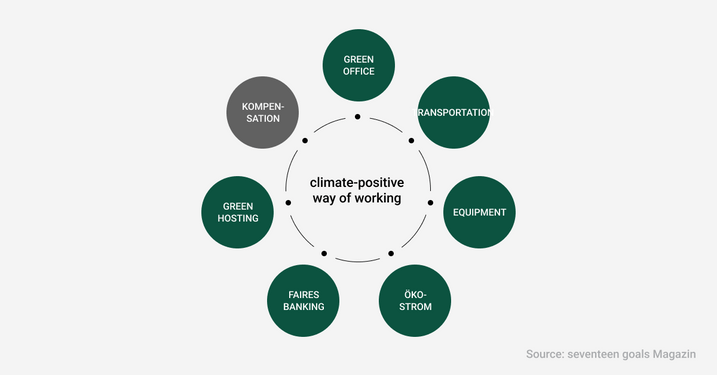
Factors for a climate-positive way of working.
Sustainability for AI companies is not just about ecological responsibility but also about ethical AI development. This includes creating transparent and fair algorithms that do not amplify discrimination or social inequalities. AI systems should also be used for sustainable purposes, such as optimizing supply chains, managing renewable energies, or monitoring environmental changes.
But AI can also be sustainable in customer service by using resources more efficiently and thereby increasing customer satisfaction. Above all, social sustainability is actively supported, as employees are relieved of workload by automating repetitive tasks.
Finally, it is important to establish a sustainable corporate culture. Employees and partners should be made aware of ecological and social responsibility so that sustainability is considered in all business areas. By aligning their processes, technologies, and values with sustainable principles, AI companies can reduce their ecological footprint and actively contribute to solving global challenges.
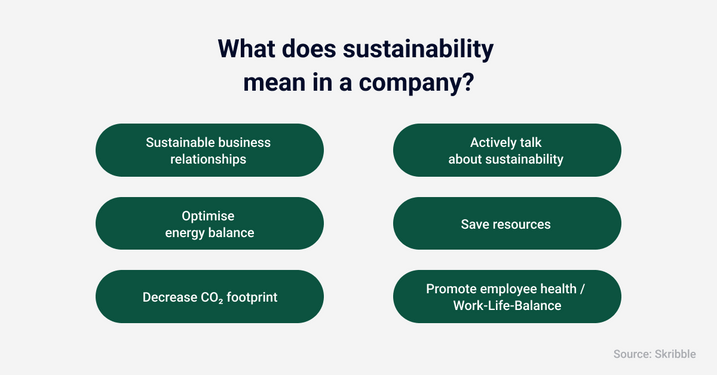
Checklist for sustainability in the company.
OMQ relies on artificial intelligence to revolutionize customer service - but sustainability should not take a back seat. Below we show how we conserve resources, save energy and at the same time create a healthy working atmosphere in order to increase both customer and employee satisfaction.
Use of Green Data Centers
OMQ’s main AI server region is located in central Sweden, a cooler area where less energy is required for cooling. Additionally, OMQ uses the Azure Cloud, which is committed to achieving 100% renewable energy with continuous monitoring.
Since OMQ uses different cloud regions to reach customers worldwide, it is not yet possible to use only renewable energy. However, OMQ is aware of its CO₂ footprint and deliberately opts for sustainable cloud providers and locations.
Development of Sustainable Models
Large Language Models (LLMs) offer many advantages but also require a high energy consumption. Therefore, OMQ participates in a government-funded AI project and collaborates with universities to develop LLM models that optimize both the CO₂ footprint and computational usage.
Together with our research partner, HU Berlin, we are developing powerful and more sustainable LLMs that offer the highest accuracy and efficiency for customer support automation.
Green Cloud Computing
The use of cloud servers with renewable energy alone is often not enough to ensure truly sustainable cloud computing. A comprehensive reduction and restructuring of computation, network usage, and storage usage are necessary for all components to work together efficiently.
OMQ is actively committed to sustainable cloud solutions and follows the best practices recommended by the German government in KPI4DCE 2.0. In 2024, we began restructuring our infrastructure with our cloud providers Azure and AWS based on these guidelines to use our computational resources more environmentally friendly.
Remote Work
The entire OMQ team works remotely, eliminating daily commuting. This significantly contributes to reducing CO₂ emissions and supports a more environmentally friendly way of working.
Moreover, the remote work model not only promotes sustainability but also flexibility and employee satisfaction. By eliminating commutes, we save valuable time and resources while also making a positive contribution to climate protection.
Paperless Processes
OMQ relies on paperless processes to conserve resources and reduce our ecological footprint. Instead of relying on physical documents, we use digital solutions that are not only more sustainable but also more efficient. This enables optimized workflows where information is available more quickly, and less material is consumed.
We have digitised the management of our accounting and financial documents. By digitising such processes, we avoid unnecessary paper consumption and at the same time reduce the energy consumption associated with printing, storage and transport.
Digital Meetings and Events
OMQ promotes the use of digital meetings and events to avoid business trips and minimize CO₂ emissions. Through modern communication technologies, we can easily collaborate with colleagues, customers, and partners worldwide without the need for travel. This not only saves time but also contributes significantly to reducing our ecological footprint, as flights and car journeys are eliminated.
Another example of our sustainable way of working is the OMQ lunch break, which is also designed as a digital event. Instead of organizing physical meetings or events, we use this opportunity to engage in virtual meetings, avoiding “business travel” in this case as well. This not only supports our sustainability goal but also strengthens team culture and communication – all without the ecological impact that travel would bring.
When we plan on-site events, we make sure that they are easily accessible by public transport and that we support local businesses and restaurants.
Social Responsibility and Corporate Culture
At OMQ, we take our social responsibility seriously and foster a corporate culture focused on sustainability, equal opportunity, and well-being. When it comes to on-site events like the annual Christmas party, we place great value on the majority of the team preferring sustainable travel methods.
Many employees consciously choose trains instead of airplanes or cars, and we support the use of e-mobility to minimize CO₂ emissions. These sustainable decisions reflect our commitment to fostering an environmentally conscious attitude even in the personal areas of the company.
In addition to ecological responsibility, social sustainability plays a central role in our corporate culture. We are committed to ensuring a good work-life balance and offer our employees the flexibility to structure their work in a way that meets both their professional and personal needs.
Equal opportunities are a fundamental principle for us – we promote a culture where all employees, regardless of gender, origin, or background, have equal opportunities. We also place great importance on the health and well-being of our team.
Conclusion
Sustainability is a multifaceted concept encompassing ecological, economic, and social responsibility. It means using resources in a way that preserves them for future generations while creating a balanced approach between economic growth and social justice. For an AI company like OMQ, sustainability means not only reducing our ecological footprint but also handling the technologies and employees we work with responsibly.
We see it as our task to develop innovative and resource-efficient solutions while fostering a corporate culture that focuses on equal opportunity, health, and flexibility.
The sustainable measures OMQ has already implemented range from using energy-efficient data centers and developing environmentally friendly AI models to focusing strongly on digital, paperless processes and meetings.
We rely on remote work and promote a corporate culture that is both ecologically and socially responsible. Social sustainability plays just as important a role as ecological responsibility, and through our decisions, we actively contribute to creating a better future.
By combining best practices from the tech industry with a sustainable approach, we aim not only to positively impact our company but also society as a whole.
Would you like to find out more about our sustainability concept or do you have tips and suggestions for us on how we can make our company even more sustainable? Then feel free to tell us. We look forward to new ideas and feedback! :)
P.S.: Of course, we are also happy to answer questions about our AI solutions in customer service. ;)

